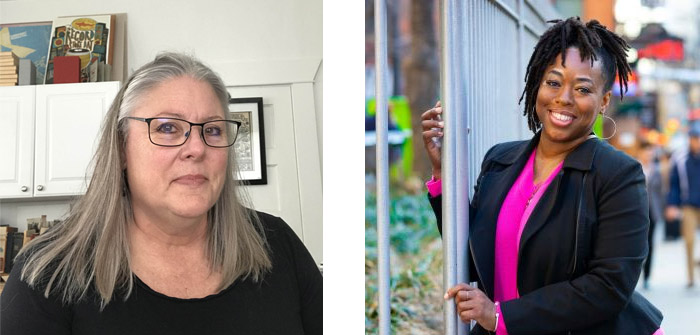((L-R) Roberta Lavadour and Kamilah Long | Photos courtesy of Oregon Arts Commission)
Roberta Lavadour, the executive director of the Pendleton Center for the Arts, and Kamilah Long, founder and CEO of The Black Whole, have been appointed to the Oregon Arts Commission by Governor Kate Brown.
Lavadour is an artist and arts administrator who lives and works in Pendleton. In addition to her leadership position with the Pendleton Center for the Arts, she serves as an advisor to the Roundhouse Foundation Residency program and as a member of the City of Pendleton’s Art Commission.
Long is an innovative leader and dynamic theatrical professional. Her multifaceted theater career includes roles as an actor, director, producer, educator, fundraiser, activist and speaker. The Black Whole is a multimedia company focused on centering the Black global community through art and storytelling. It recently co-produced and served as a writer on the short film “You Go Girl,” selected for the Sundance Film Festival.
“Roberta and Kamilah epitomize the depth of passion and experience we need to support the arts in Oregon,” said Commission Chair Jenny Green. “Their energy, creativity and commitment to equity will be invaluable in our planning and service to artists, arts organizations and all Oregonians.”
Lavadour maintains an active studio practice, and her artist’s books and design bindings are widely exhibited and reside in collections both nationally and internationally. She was previously recognized with an Oregon Arts Commission Artist Fellowship (2002) and a Career Opportunity Program award (2008). In addition to papermaking, letterpress and silkscreen printing, exploring a wide range of book structures, and the other myriad facets of book arts, she enjoys gardening and being a Grammy.
She holds a liberal studies degree from Oregon State University (2017), with a focus on communications and community development. Her work can be viewed at RobertaLavadour.com.
“Making art is important work, and vigorously supporting that work is one of the things that defines Oregon,” said Roberta. “Fostering a culture of creative expression unlocks creative problem-solving skills that energize our public spaces, our economy and our families.”
Long started her career in theatre as a storyteller, which led her to join Actors Equity and to become a professional actor before completing her undergraduate theater degree from Alabama State University. She went on to receive her master’s degree in fine arts in performance, along with a certificate in African American Theatre from the University of Louisville. Kamilah is a world-class orator, delivering commencement keynotes and traveling as far as South Africa to speak.
“It is such an honor to serve on the Oregon Arts Commission because they do such great work!” said Long. “This team has a reputation as a group of deep and empathetic thinkers who really focus on making funding as accessible as possible. As both an artist and administrator, I understand both worlds and look forward to diving in and lending my skills and talent to support other artists and arts organizations.”
Lavadour and Long begin their four-year terms immediately.
The Oregon Arts Commission provides leadership, funding and arts programs through its grants, special initiatives and services. Nine commissioners, appointed by the Governor, determine arts needs and establish policies for public support of the arts. The Arts Commission became part of Business Oregon (formerly Oregon Economic and Community Development Department) in 1993, in recognition of the expanding role the arts play in the broader social, economic and educational arenas of Oregon communities. In 2003, the Oregon legislature moved the operations of the Oregon Cultural Trust to the Arts Commission, streamlining operations and making use of the Commission’s expertise in grantmaking, arts and cultural information and community cultural development.
The Arts Commission is supported with general funds appropriated by the Oregon legislature and with federal funds from the National Endowment for the Arts as well as funds from the Oregon Cultural Trust.

